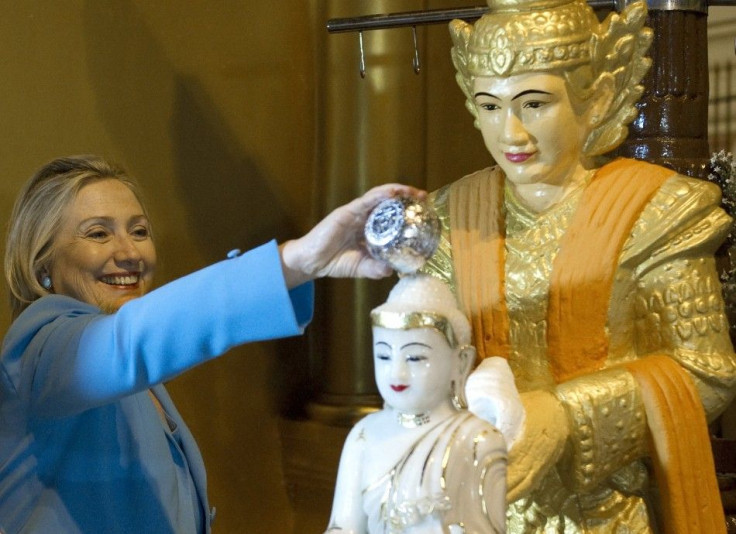In Historic Visit to Burma, Clinton Meets With Aung San Suu Kyi

On a historic visit to Myanmar (Burma), U.S. Secretary of State Hillary Clinton said she is encouraged by signs of reform in the once-repressive Asian state, but cautioned that Washington is not yet prepared to lift sanctions against the country.
However, after conferring with Thein Sein, the Burmese President, Clinton said that the U.S. would consider improving ties if it is satisfied that Burma is making meaningful progress towards becoming a democracy.
The United States is prepared to walk the path of reform with you if you keep moving in the right direction, she told senior Burmese officials and reporters.
She added: These are incremental steps and we are prepared to go further if reforms maintain momentum. In that spirit, we are discussing what it will take to upgrade diplomatic relations and exchange ambassadors. Over time, this could become an important channel to air concerns, monitor and support progress and build trust on both sides.”
This trip represented the highest official U.S. visit to Burma in more than fifty years.
I am here today because President Obama and myself are encouraged by the steps that you and your government have taken to provide for your people, Clinton told Thein Sein.
The Burmese president hailed her visit as a “milestone” and a “historic and a new chapter in relations.
The Secretary of State also requested that Burma cut off its ‘illicit’ ties with North Korea and cooperate with the U.S. in finding dead bodies of soldiers killed here during World War II.
Clinton also met with Nobel Peace Prize winner Aung San Suu Kyi, the renowned human rights activist and pro-democracy champion whose 20-year house arrest was recently lifted by Burmese authorities under the auspices of the new government that took over this year. In 1990, Suu Kyi’s party apparently won elections which the nation’s military refused to accept and overturned.
Suu Kyi will reportedly run in parliamentary elections next year under the banner of her National League for Democracy party.
Burma has largely been isolated from the outside world since a coup in 1962 brought a brutal military dictatorship to power.
The military finally gave up power to a nominally civilian regime last year. Since that time, the government has made some modest reforms, including setting up a human rights commission, allowing the formation of labor unions and freeing hundreds of political prisoners, among other measures.
Meanwhile, a large shadow over Burma remains Communist China, which has enjoyed fairly good relations with the country and would clearly feel threatened by American moves in the region. The Chinese have also invested heavily in Burma, particularly in its energy sector.
China’s Global Times newspaper wrote in a scathing editorial: China has no resistance toward Myanmar seeking improved relationship with the West, but it will not accept this while seeing its interests stamped on.”
© Copyright IBTimes 2024. All rights reserved.





















